Analysis of Behaviour Management in Classroom and Theories
VerifiedAdded on 2023/01/10
|20
|5873
|33
Report
AI Summary
This report delves into the critical aspects of behaviour management and cognitive learning within educational settings, emphasizing their importance for fostering competitive learning environments. It analyzes the significance of communication between educators and students in cultivating academic synergy and understanding individual learning needs. The report explores various principles of behaviour management, including specialist knowledge, experimental learning, building relationships, and involving parents. It further examines group and individual behaviour management strategies. Additionally, the report discusses prominent behaviour management theories, such as previous experience, individual needs, and motivational theories like Maslow's and Herzberg's. It evaluates the effectiveness of creative and innovative approaches like learner-centred and self-directed studies. The report concludes by highlighting the impact of flexible online learning, emphasizing its strengths and weaknesses. The analysis provides practical insights into creating effective classroom practices.
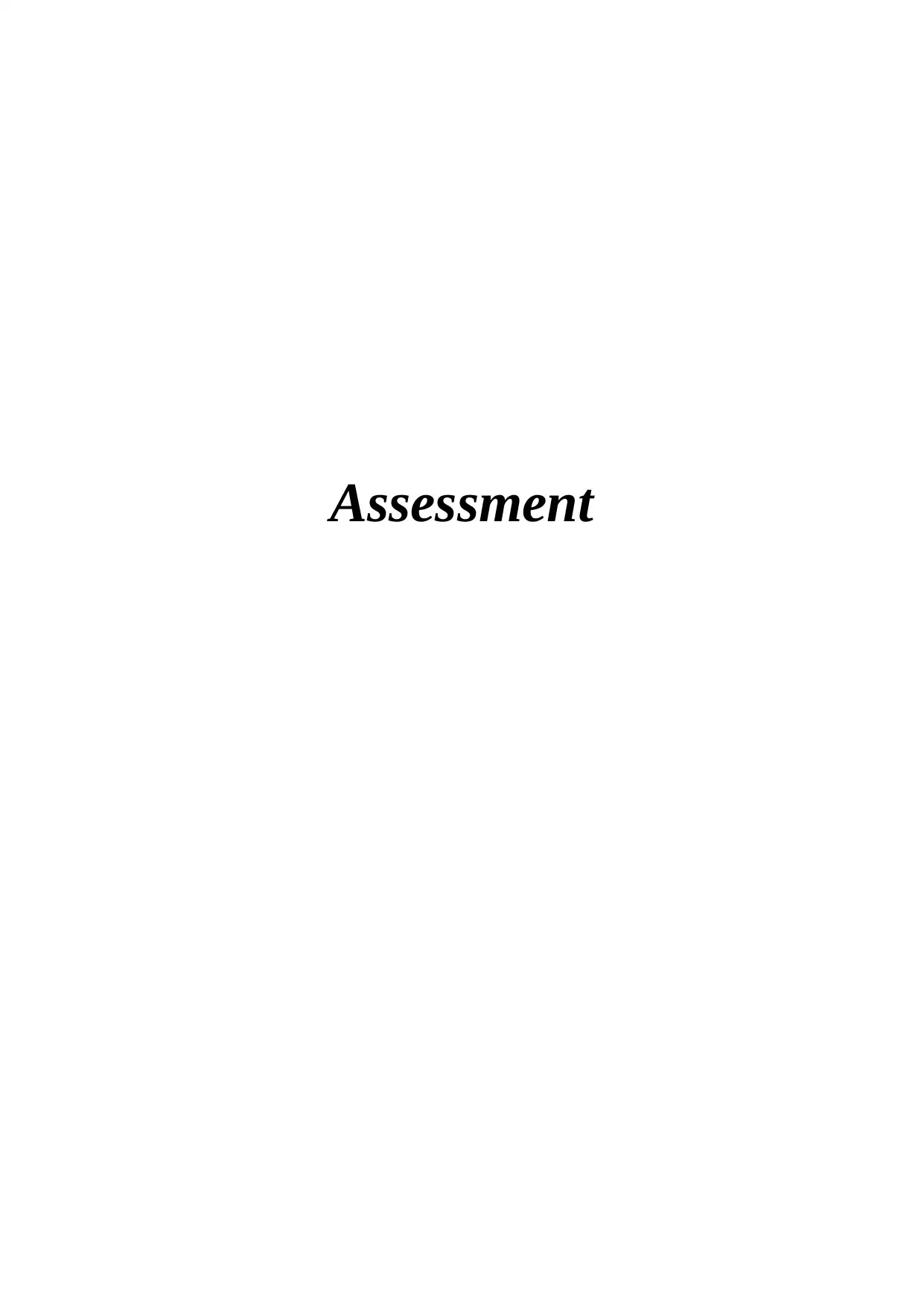
Assessment
Paraphrase This Document
Need a fresh take? Get an instant paraphrase of this document with our AI Paraphraser
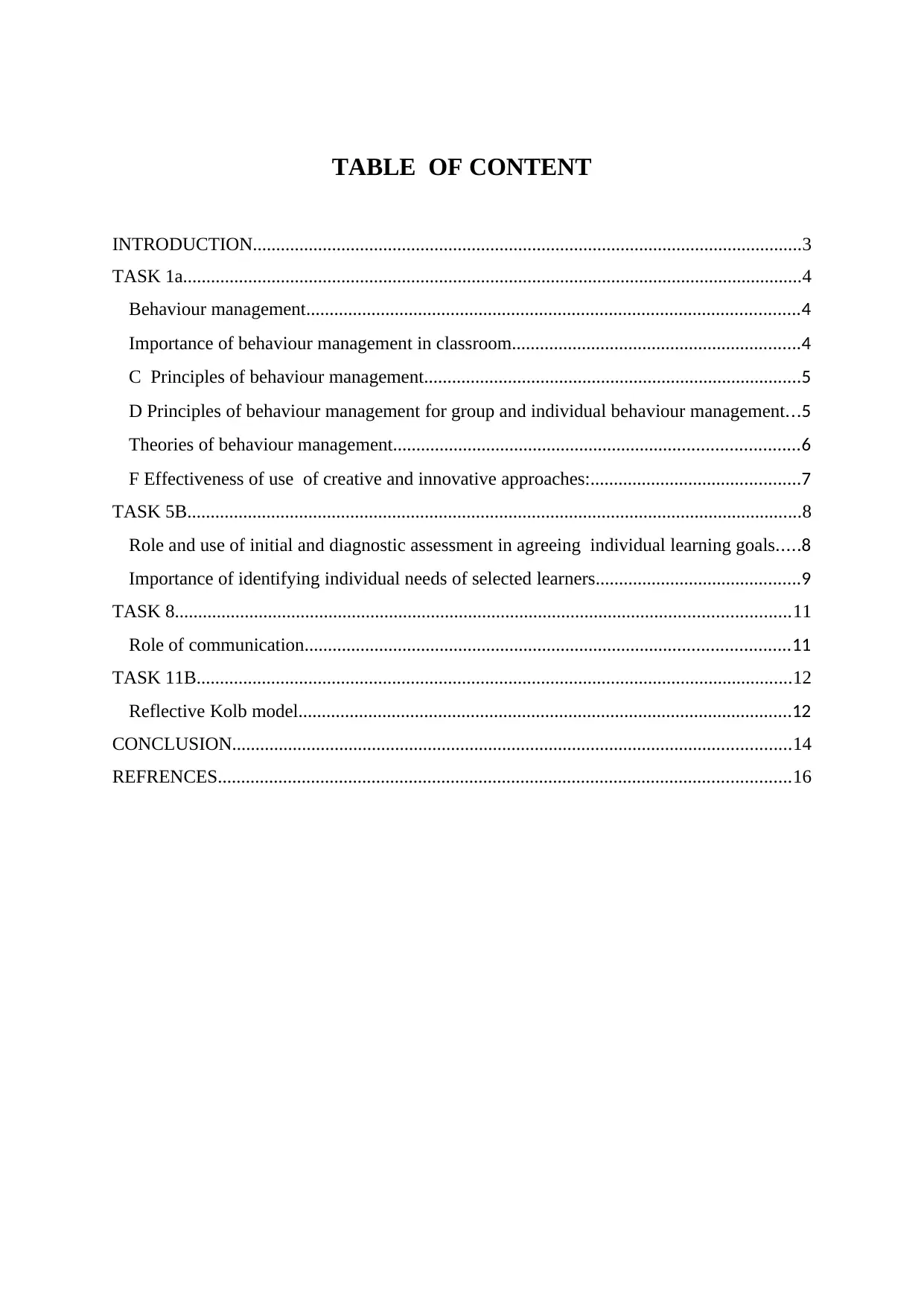
TABLE OF CONTENT
INTRODUCTION......................................................................................................................3
TASK 1a.....................................................................................................................................4
Behaviour management..........................................................................................................4
Importance of behaviour management in classroom..............................................................4
C Principles of behaviour management.................................................................................5
D Principles of behaviour management for group and individual behaviour management...5
Theories of behaviour management.......................................................................................6
F Effectiveness of use of creative and innovative approaches:.............................................7
TASK 5B....................................................................................................................................8
Role and use of initial and diagnostic assessment in agreeing individual learning goals.....8
Importance of identifying individual needs of selected learners............................................9
TASK 8....................................................................................................................................11
Role of communication........................................................................................................11
TASK 11B................................................................................................................................12
Reflective Kolb model..........................................................................................................12
CONCLUSION........................................................................................................................14
REFRENCES...........................................................................................................................16
INTRODUCTION......................................................................................................................3
TASK 1a.....................................................................................................................................4
Behaviour management..........................................................................................................4
Importance of behaviour management in classroom..............................................................4
C Principles of behaviour management.................................................................................5
D Principles of behaviour management for group and individual behaviour management...5
Theories of behaviour management.......................................................................................6
F Effectiveness of use of creative and innovative approaches:.............................................7
TASK 5B....................................................................................................................................8
Role and use of initial and diagnostic assessment in agreeing individual learning goals.....8
Importance of identifying individual needs of selected learners............................................9
TASK 8....................................................................................................................................11
Role of communication........................................................................................................11
TASK 11B................................................................................................................................12
Reflective Kolb model..........................................................................................................12
CONCLUSION........................................................................................................................14
REFRENCES...........................................................................................................................16
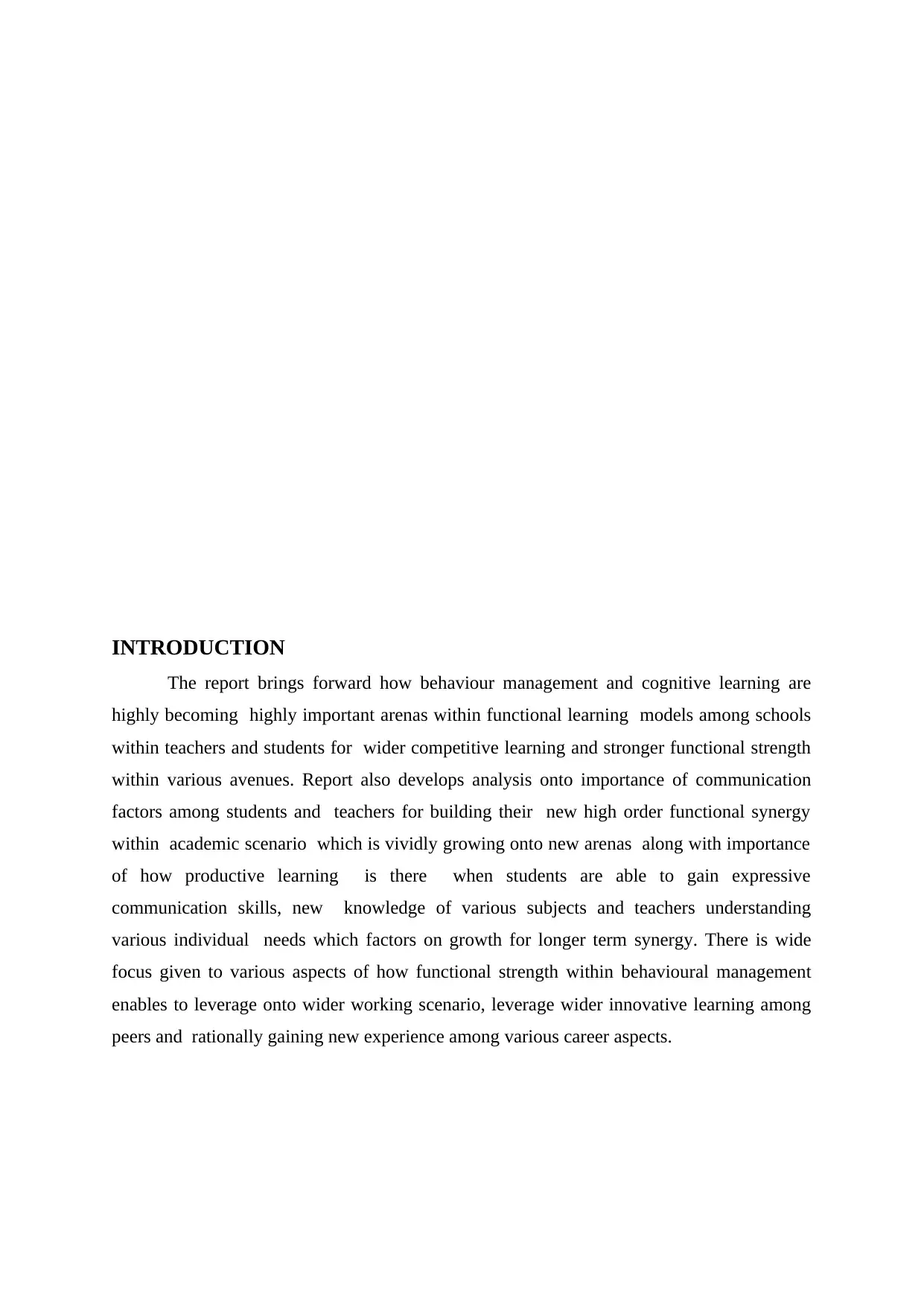
INTRODUCTION
The report brings forward how behaviour management and cognitive learning are
highly becoming highly important arenas within functional learning models among schools
within teachers and students for wider competitive learning and stronger functional strength
within various avenues. Report also develops analysis onto importance of communication
factors among students and teachers for building their new high order functional synergy
within academic scenario which is vividly growing onto new arenas along with importance
of how productive learning is there when students are able to gain expressive
communication skills, new knowledge of various subjects and teachers understanding
various individual needs which factors on growth for longer term synergy. There is wide
focus given to various aspects of how functional strength within behavioural management
enables to leverage onto wider working scenario, leverage wider innovative learning among
peers and rationally gaining new experience among various career aspects.
The report brings forward how behaviour management and cognitive learning are
highly becoming highly important arenas within functional learning models among schools
within teachers and students for wider competitive learning and stronger functional strength
within various avenues. Report also develops analysis onto importance of communication
factors among students and teachers for building their new high order functional synergy
within academic scenario which is vividly growing onto new arenas along with importance
of how productive learning is there when students are able to gain expressive
communication skills, new knowledge of various subjects and teachers understanding
various individual needs which factors on growth for longer term synergy. There is wide
focus given to various aspects of how functional strength within behavioural management
enables to leverage onto wider working scenario, leverage wider innovative learning among
peers and rationally gaining new experience among various career aspects.
⊘ This is a preview!⊘
Do you want full access?
Subscribe today to unlock all pages.

Trusted by 1+ million students worldwide
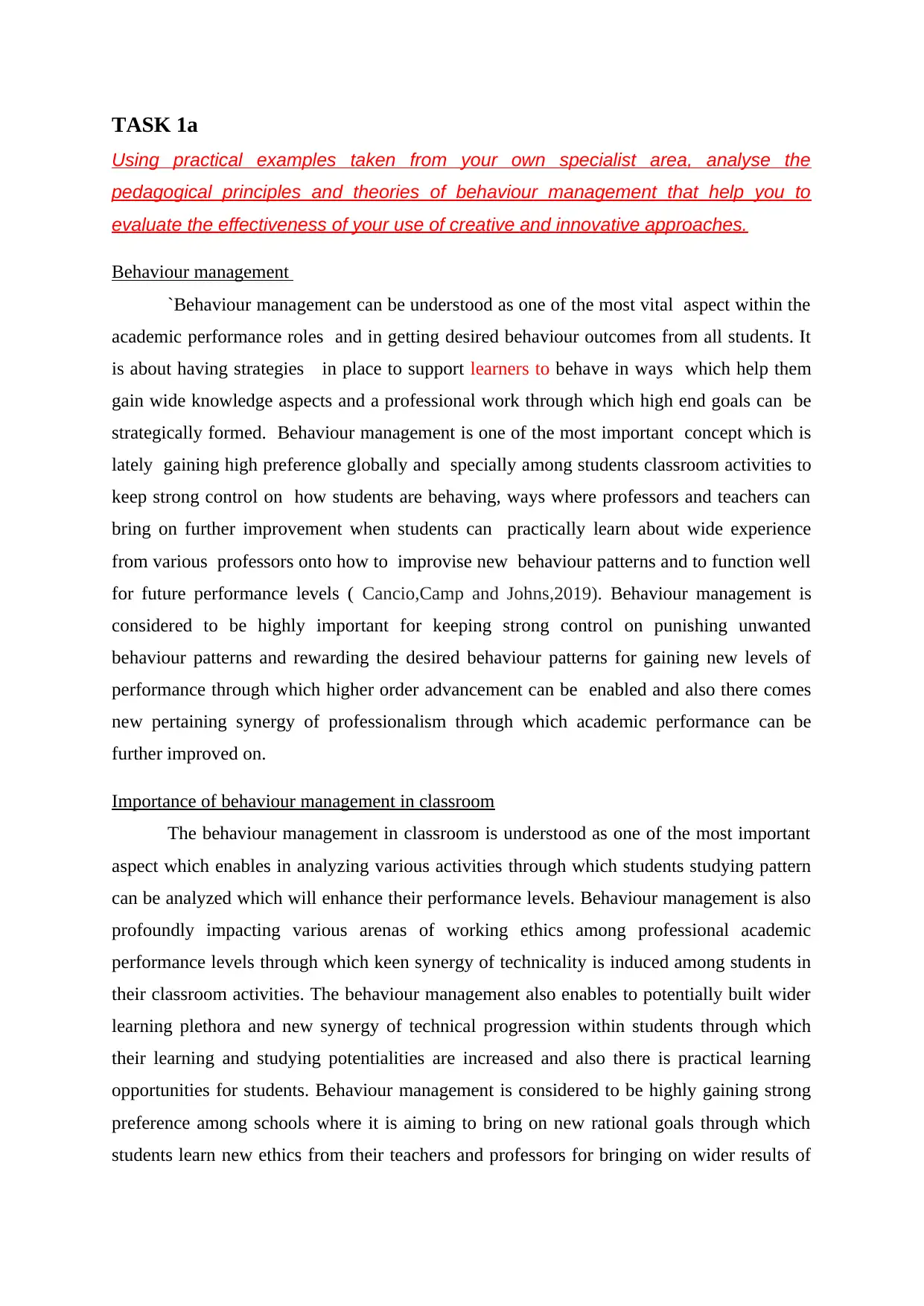
TASK 1a
Using practical examples taken from your own specialist area, analyse the
pedagogical principles and theories of behaviour management that help you to
evaluate the effectiveness of your use of creative and innovative approaches.
Behaviour management
`Behaviour management can be understood as one of the most vital aspect within the
academic performance roles and in getting desired behaviour outcomes from all students. It
is about having strategies in place to support learners to behave in ways which help them
gain wide knowledge aspects and a professional work through which high end goals can be
strategically formed. Behaviour management is one of the most important concept which is
lately gaining high preference globally and specially among students classroom activities to
keep strong control on how students are behaving, ways where professors and teachers can
bring on further improvement when students can practically learn about wide experience
from various professors onto how to improvise new behaviour patterns and to function well
for future performance levels ( Cancio,Camp and Johns,2019). Behaviour management is
considered to be highly important for keeping strong control on punishing unwanted
behaviour patterns and rewarding the desired behaviour patterns for gaining new levels of
performance through which higher order advancement can be enabled and also there comes
new pertaining synergy of professionalism through which academic performance can be
further improved on.
Importance of behaviour management in classroom
The behaviour management in classroom is understood as one of the most important
aspect which enables in analyzing various activities through which students studying pattern
can be analyzed which will enhance their performance levels. Behaviour management is also
profoundly impacting various arenas of working ethics among professional academic
performance levels through which keen synergy of technicality is induced among students in
their classroom activities. The behaviour management also enables to potentially built wider
learning plethora and new synergy of technical progression within students through which
their learning and studying potentialities are increased and also there is practical learning
opportunities for students. Behaviour management is considered to be highly gaining strong
preference among schools where it is aiming to bring on new rational goals through which
students learn new ethics from their teachers and professors for bringing on wider results of
Using practical examples taken from your own specialist area, analyse the
pedagogical principles and theories of behaviour management that help you to
evaluate the effectiveness of your use of creative and innovative approaches.
Behaviour management
`Behaviour management can be understood as one of the most vital aspect within the
academic performance roles and in getting desired behaviour outcomes from all students. It
is about having strategies in place to support learners to behave in ways which help them
gain wide knowledge aspects and a professional work through which high end goals can be
strategically formed. Behaviour management is one of the most important concept which is
lately gaining high preference globally and specially among students classroom activities to
keep strong control on how students are behaving, ways where professors and teachers can
bring on further improvement when students can practically learn about wide experience
from various professors onto how to improvise new behaviour patterns and to function well
for future performance levels ( Cancio,Camp and Johns,2019). Behaviour management is
considered to be highly important for keeping strong control on punishing unwanted
behaviour patterns and rewarding the desired behaviour patterns for gaining new levels of
performance through which higher order advancement can be enabled and also there comes
new pertaining synergy of professionalism through which academic performance can be
further improved on.
Importance of behaviour management in classroom
The behaviour management in classroom is understood as one of the most important
aspect which enables in analyzing various activities through which students studying pattern
can be analyzed which will enhance their performance levels. Behaviour management is also
profoundly impacting various arenas of working ethics among professional academic
performance levels through which keen synergy of technicality is induced among students in
their classroom activities. The behaviour management also enables to potentially built wider
learning plethora and new synergy of technical progression within students through which
their learning and studying potentialities are increased and also there is practical learning
opportunities for students. Behaviour management is considered to be highly gaining strong
preference among schools where it is aiming to bring on new rational goals through which
students learn new ethics from their teachers and professors for bringing on wider results of
Paraphrase This Document
Need a fresh take? Get an instant paraphrase of this document with our AI Paraphraser
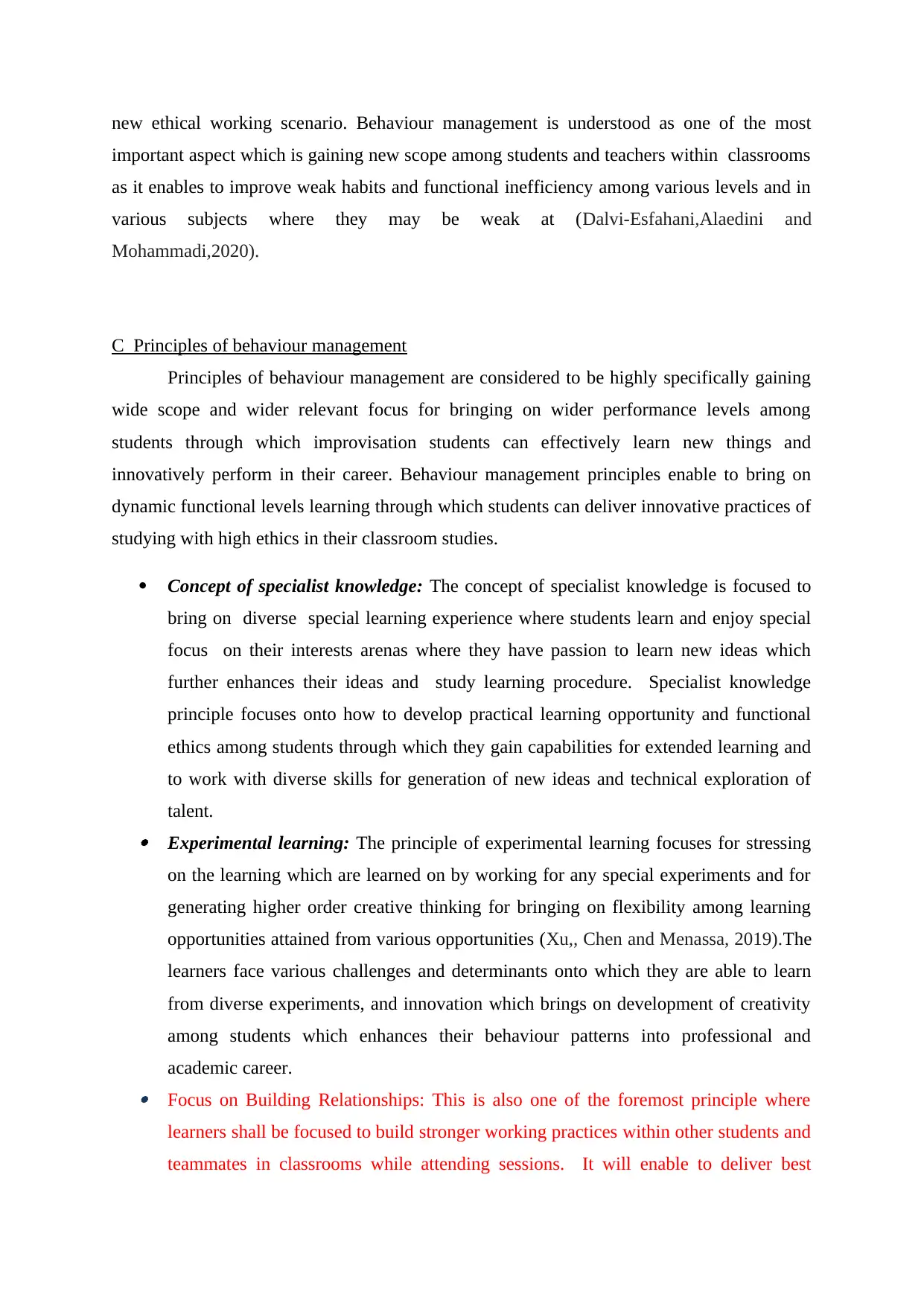
new ethical working scenario. Behaviour management is understood as one of the most
important aspect which is gaining new scope among students and teachers within classrooms
as it enables to improve weak habits and functional inefficiency among various levels and in
various subjects where they may be weak at (Dalvi-Esfahani,Alaedini and
Mohammadi,2020).
C Principles of behaviour management
Principles of behaviour management are considered to be highly specifically gaining
wide scope and wider relevant focus for bringing on wider performance levels among
students through which improvisation students can effectively learn new things and
innovatively perform in their career. Behaviour management principles enable to bring on
dynamic functional levels learning through which students can deliver innovative practices of
studying with high ethics in their classroom studies.
Concept of specialist knowledge: The concept of specialist knowledge is focused to
bring on diverse special learning experience where students learn and enjoy special
focus on their interests arenas where they have passion to learn new ideas which
further enhances their ideas and study learning procedure. Specialist knowledge
principle focuses onto how to develop practical learning opportunity and functional
ethics among students through which they gain capabilities for extended learning and
to work with diverse skills for generation of new ideas and technical exploration of
talent. Experimental learning: The principle of experimental learning focuses for stressing
on the learning which are learned on by working for any special experiments and for
generating higher order creative thinking for bringing on flexibility among learning
opportunities attained from various opportunities (Xu,, Chen and Menassa, 2019).The
learners face various challenges and determinants onto which they are able to learn
from diverse experiments, and innovation which brings on development of creativity
among students which enhances their behaviour patterns into professional and
academic career. Focus on Building Relationships: This is also one of the foremost principle where
learners shall be focused to build stronger working practices within other students and
teammates in classrooms while attending sessions. It will enable to deliver best
important aspect which is gaining new scope among students and teachers within classrooms
as it enables to improve weak habits and functional inefficiency among various levels and in
various subjects where they may be weak at (Dalvi-Esfahani,Alaedini and
Mohammadi,2020).
C Principles of behaviour management
Principles of behaviour management are considered to be highly specifically gaining
wide scope and wider relevant focus for bringing on wider performance levels among
students through which improvisation students can effectively learn new things and
innovatively perform in their career. Behaviour management principles enable to bring on
dynamic functional levels learning through which students can deliver innovative practices of
studying with high ethics in their classroom studies.
Concept of specialist knowledge: The concept of specialist knowledge is focused to
bring on diverse special learning experience where students learn and enjoy special
focus on their interests arenas where they have passion to learn new ideas which
further enhances their ideas and study learning procedure. Specialist knowledge
principle focuses onto how to develop practical learning opportunity and functional
ethics among students through which they gain capabilities for extended learning and
to work with diverse skills for generation of new ideas and technical exploration of
talent. Experimental learning: The principle of experimental learning focuses for stressing
on the learning which are learned on by working for any special experiments and for
generating higher order creative thinking for bringing on flexibility among learning
opportunities attained from various opportunities (Xu,, Chen and Menassa, 2019).The
learners face various challenges and determinants onto which they are able to learn
from diverse experiments, and innovation which brings on development of creativity
among students which enhances their behaviour patterns into professional and
academic career. Focus on Building Relationships: This is also one of the foremost principle where
learners shall be focused to build stronger working practices within other students and
teammates in classrooms while attending sessions. It will enable to deliver best
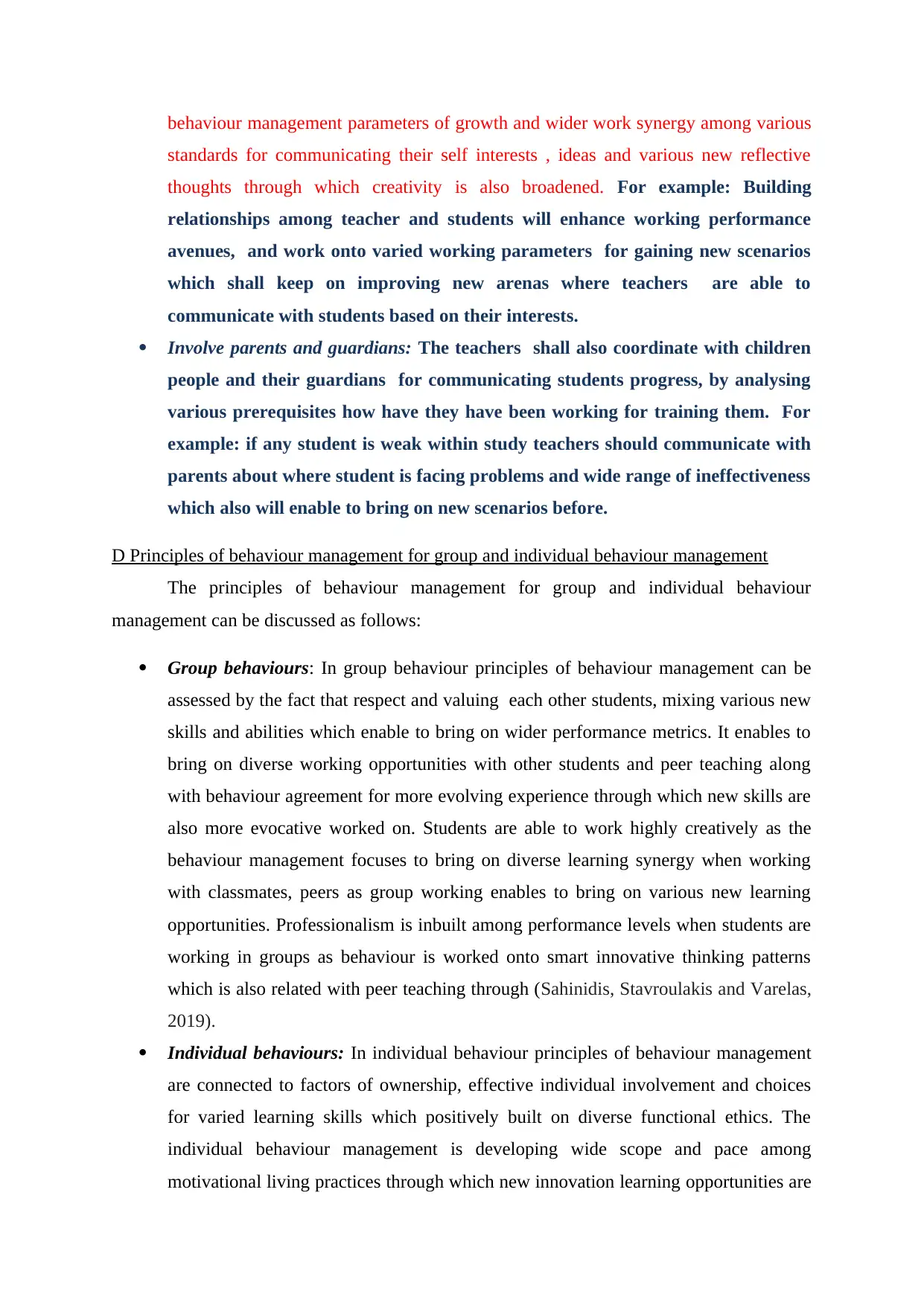
behaviour management parameters of growth and wider work synergy among various
standards for communicating their self interests , ideas and various new reflective
thoughts through which creativity is also broadened. For example: Building
relationships among teacher and students will enhance working performance
avenues, and work onto varied working parameters for gaining new scenarios
which shall keep on improving new arenas where teachers are able to
communicate with students based on their interests.
Involve parents and guardians: The teachers shall also coordinate with children
people and their guardians for communicating students progress, by analysing
various prerequisites how have they have been working for training them. For
example: if any student is weak within study teachers should communicate with
parents about where student is facing problems and wide range of ineffectiveness
which also will enable to bring on new scenarios before.
D Principles of behaviour management for group and individual behaviour management
The principles of behaviour management for group and individual behaviour
management can be discussed as follows:
Group behaviours: In group behaviour principles of behaviour management can be
assessed by the fact that respect and valuing each other students, mixing various new
skills and abilities which enable to bring on wider performance metrics. It enables to
bring on diverse working opportunities with other students and peer teaching along
with behaviour agreement for more evolving experience through which new skills are
also more evocative worked on. Students are able to work highly creatively as the
behaviour management focuses to bring on diverse learning synergy when working
with classmates, peers as group working enables to bring on various new learning
opportunities. Professionalism is inbuilt among performance levels when students are
working in groups as behaviour is worked onto smart innovative thinking patterns
which is also related with peer teaching through (Sahinidis, Stavroulakis and Varelas,
2019).
Individual behaviours: In individual behaviour principles of behaviour management
are connected to factors of ownership, effective individual involvement and choices
for varied learning skills which positively built on diverse functional ethics. The
individual behaviour management is developing wide scope and pace among
motivational living practices through which new innovation learning opportunities are
standards for communicating their self interests , ideas and various new reflective
thoughts through which creativity is also broadened. For example: Building
relationships among teacher and students will enhance working performance
avenues, and work onto varied working parameters for gaining new scenarios
which shall keep on improving new arenas where teachers are able to
communicate with students based on their interests.
Involve parents and guardians: The teachers shall also coordinate with children
people and their guardians for communicating students progress, by analysing
various prerequisites how have they have been working for training them. For
example: if any student is weak within study teachers should communicate with
parents about where student is facing problems and wide range of ineffectiveness
which also will enable to bring on new scenarios before.
D Principles of behaviour management for group and individual behaviour management
The principles of behaviour management for group and individual behaviour
management can be discussed as follows:
Group behaviours: In group behaviour principles of behaviour management can be
assessed by the fact that respect and valuing each other students, mixing various new
skills and abilities which enable to bring on wider performance metrics. It enables to
bring on diverse working opportunities with other students and peer teaching along
with behaviour agreement for more evolving experience through which new skills are
also more evocative worked on. Students are able to work highly creatively as the
behaviour management focuses to bring on diverse learning synergy when working
with classmates, peers as group working enables to bring on various new learning
opportunities. Professionalism is inbuilt among performance levels when students are
working in groups as behaviour is worked onto smart innovative thinking patterns
which is also related with peer teaching through (Sahinidis, Stavroulakis and Varelas,
2019).
Individual behaviours: In individual behaviour principles of behaviour management
are connected to factors of ownership, effective individual involvement and choices
for varied learning skills which positively built on diverse functional ethics. The
individual behaviour management is developing wide scope and pace among
motivational living practices through which new innovation learning opportunities are
⊘ This is a preview!⊘
Do you want full access?
Subscribe today to unlock all pages.

Trusted by 1+ million students worldwide
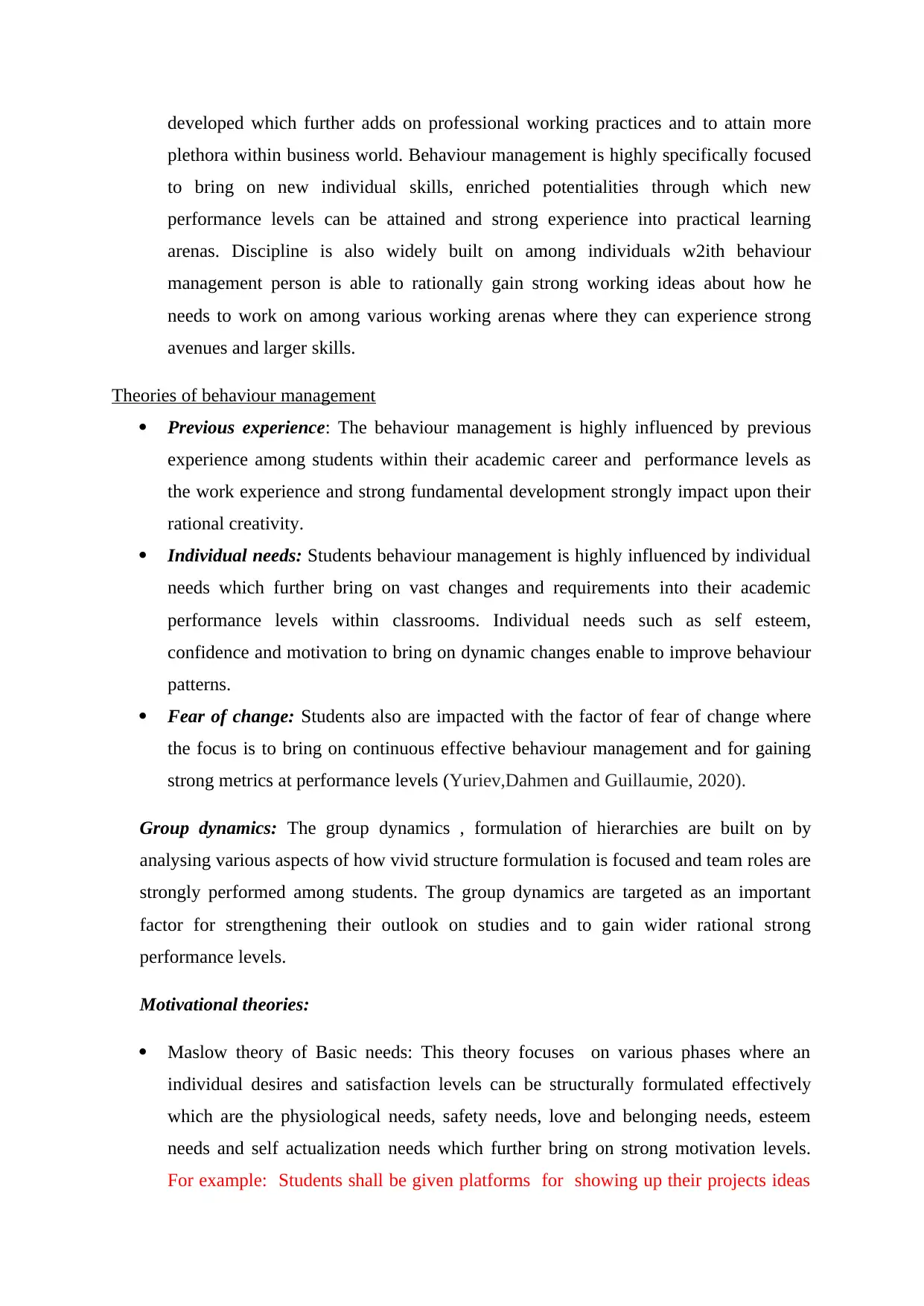
developed which further adds on professional working practices and to attain more
plethora within business world. Behaviour management is highly specifically focused
to bring on new individual skills, enriched potentialities through which new
performance levels can be attained and strong experience into practical learning
arenas. Discipline is also widely built on among individuals w2ith behaviour
management person is able to rationally gain strong working ideas about how he
needs to work on among various working arenas where they can experience strong
avenues and larger skills.
Theories of behaviour management
Previous experience: The behaviour management is highly influenced by previous
experience among students within their academic career and performance levels as
the work experience and strong fundamental development strongly impact upon their
rational creativity.
Individual needs: Students behaviour management is highly influenced by individual
needs which further bring on vast changes and requirements into their academic
performance levels within classrooms. Individual needs such as self esteem,
confidence and motivation to bring on dynamic changes enable to improve behaviour
patterns.
Fear of change: Students also are impacted with the factor of fear of change where
the focus is to bring on continuous effective behaviour management and for gaining
strong metrics at performance levels (Yuriev,Dahmen and Guillaumie, 2020).
Group dynamics: The group dynamics , formulation of hierarchies are built on by
analysing various aspects of how vivid structure formulation is focused and team roles are
strongly performed among students. The group dynamics are targeted as an important
factor for strengthening their outlook on studies and to gain wider rational strong
performance levels.
Motivational theories:
Maslow theory of Basic needs: This theory focuses on various phases where an
individual desires and satisfaction levels can be structurally formulated effectively
which are the physiological needs, safety needs, love and belonging needs, esteem
needs and self actualization needs which further bring on strong motivation levels.
For example: Students shall be given platforms for showing up their projects ideas
plethora within business world. Behaviour management is highly specifically focused
to bring on new individual skills, enriched potentialities through which new
performance levels can be attained and strong experience into practical learning
arenas. Discipline is also widely built on among individuals w2ith behaviour
management person is able to rationally gain strong working ideas about how he
needs to work on among various working arenas where they can experience strong
avenues and larger skills.
Theories of behaviour management
Previous experience: The behaviour management is highly influenced by previous
experience among students within their academic career and performance levels as
the work experience and strong fundamental development strongly impact upon their
rational creativity.
Individual needs: Students behaviour management is highly influenced by individual
needs which further bring on vast changes and requirements into their academic
performance levels within classrooms. Individual needs such as self esteem,
confidence and motivation to bring on dynamic changes enable to improve behaviour
patterns.
Fear of change: Students also are impacted with the factor of fear of change where
the focus is to bring on continuous effective behaviour management and for gaining
strong metrics at performance levels (Yuriev,Dahmen and Guillaumie, 2020).
Group dynamics: The group dynamics , formulation of hierarchies are built on by
analysing various aspects of how vivid structure formulation is focused and team roles are
strongly performed among students. The group dynamics are targeted as an important
factor for strengthening their outlook on studies and to gain wider rational strong
performance levels.
Motivational theories:
Maslow theory of Basic needs: This theory focuses on various phases where an
individual desires and satisfaction levels can be structurally formulated effectively
which are the physiological needs, safety needs, love and belonging needs, esteem
needs and self actualization needs which further bring on strong motivation levels.
For example: Students shall be given platforms for showing up their projects ideas
Paraphrase This Document
Need a fresh take? Get an instant paraphrase of this document with our AI Paraphraser
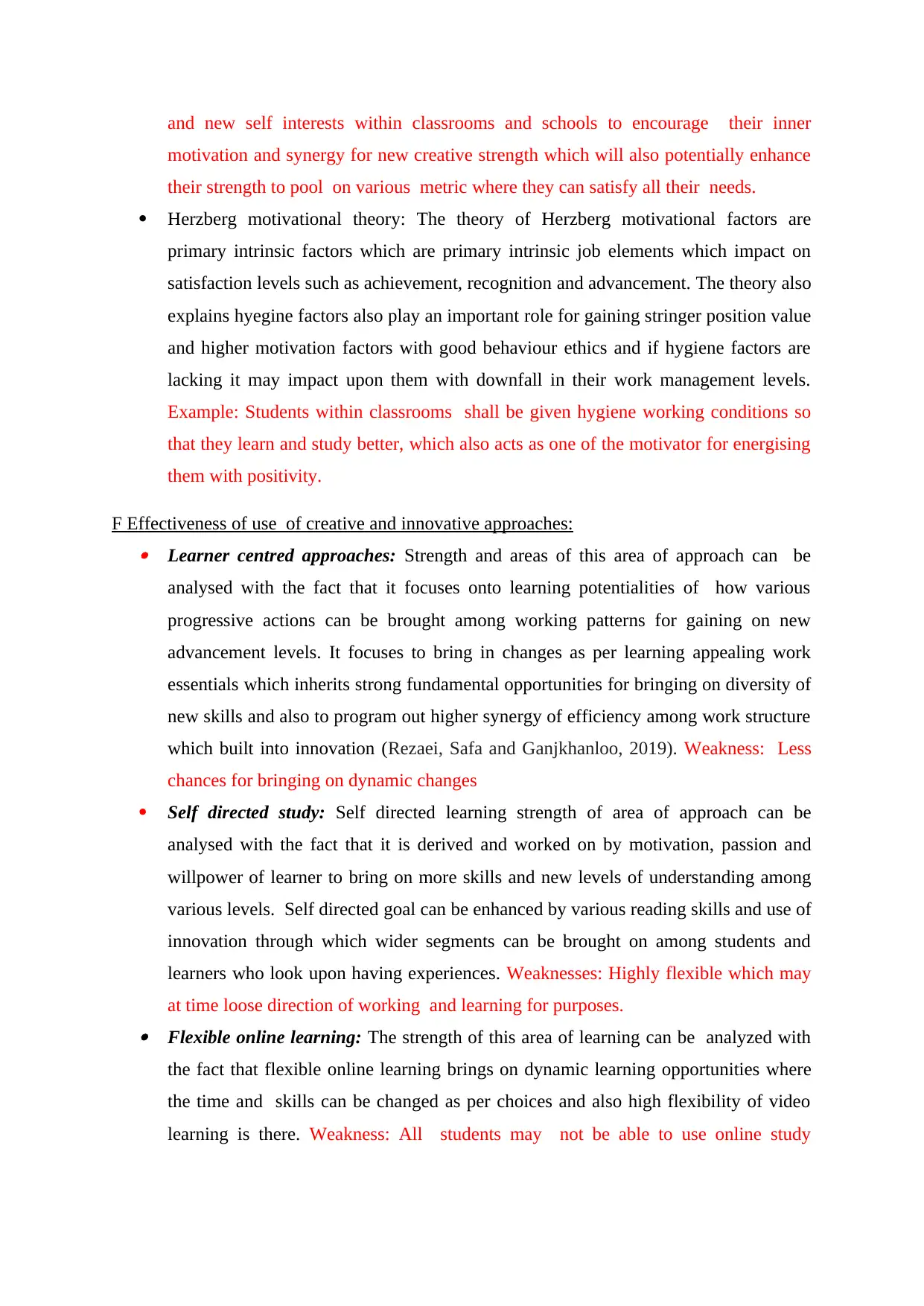
and new self interests within classrooms and schools to encourage their inner
motivation and synergy for new creative strength which will also potentially enhance
their strength to pool on various metric where they can satisfy all their needs.
Herzberg motivational theory: The theory of Herzberg motivational factors are
primary intrinsic factors which are primary intrinsic job elements which impact on
satisfaction levels such as achievement, recognition and advancement. The theory also
explains hyegine factors also play an important role for gaining stringer position value
and higher motivation factors with good behaviour ethics and if hygiene factors are
lacking it may impact upon them with downfall in their work management levels.
Example: Students within classrooms shall be given hygiene working conditions so
that they learn and study better, which also acts as one of the motivator for energising
them with positivity.
F Effectiveness of use of creative and innovative approaches: Learner centred approaches: Strength and areas of this area of approach can be
analysed with the fact that it focuses onto learning potentialities of how various
progressive actions can be brought among working patterns for gaining on new
advancement levels. It focuses to bring in changes as per learning appealing work
essentials which inherits strong fundamental opportunities for bringing on diversity of
new skills and also to program out higher synergy of efficiency among work structure
which built into innovation (Rezaei, Safa and Ganjkhanloo, 2019). Weakness: Less
chances for bringing on dynamic changes
Self directed study: Self directed learning strength of area of approach can be
analysed with the fact that it is derived and worked on by motivation, passion and
willpower of learner to bring on more skills and new levels of understanding among
various levels. Self directed goal can be enhanced by various reading skills and use of
innovation through which wider segments can be brought on among students and
learners who look upon having experiences. Weaknesses: Highly flexible which may
at time loose direction of working and learning for purposes. Flexible online learning: The strength of this area of learning can be analyzed with
the fact that flexible online learning brings on dynamic learning opportunities where
the time and skills can be changed as per choices and also high flexibility of video
learning is there. Weakness: All students may not be able to use online study
motivation and synergy for new creative strength which will also potentially enhance
their strength to pool on various metric where they can satisfy all their needs.
Herzberg motivational theory: The theory of Herzberg motivational factors are
primary intrinsic factors which are primary intrinsic job elements which impact on
satisfaction levels such as achievement, recognition and advancement. The theory also
explains hyegine factors also play an important role for gaining stringer position value
and higher motivation factors with good behaviour ethics and if hygiene factors are
lacking it may impact upon them with downfall in their work management levels.
Example: Students within classrooms shall be given hygiene working conditions so
that they learn and study better, which also acts as one of the motivator for energising
them with positivity.
F Effectiveness of use of creative and innovative approaches: Learner centred approaches: Strength and areas of this area of approach can be
analysed with the fact that it focuses onto learning potentialities of how various
progressive actions can be brought among working patterns for gaining on new
advancement levels. It focuses to bring in changes as per learning appealing work
essentials which inherits strong fundamental opportunities for bringing on diversity of
new skills and also to program out higher synergy of efficiency among work structure
which built into innovation (Rezaei, Safa and Ganjkhanloo, 2019). Weakness: Less
chances for bringing on dynamic changes
Self directed study: Self directed learning strength of area of approach can be
analysed with the fact that it is derived and worked on by motivation, passion and
willpower of learner to bring on more skills and new levels of understanding among
various levels. Self directed goal can be enhanced by various reading skills and use of
innovation through which wider segments can be brought on among students and
learners who look upon having experiences. Weaknesses: Highly flexible which may
at time loose direction of working and learning for purposes. Flexible online learning: The strength of this area of learning can be analyzed with
the fact that flexible online learning brings on dynamic learning opportunities where
the time and skills can be changed as per choices and also high flexibility of video
learning is there. Weakness: All students may not be able to use online study
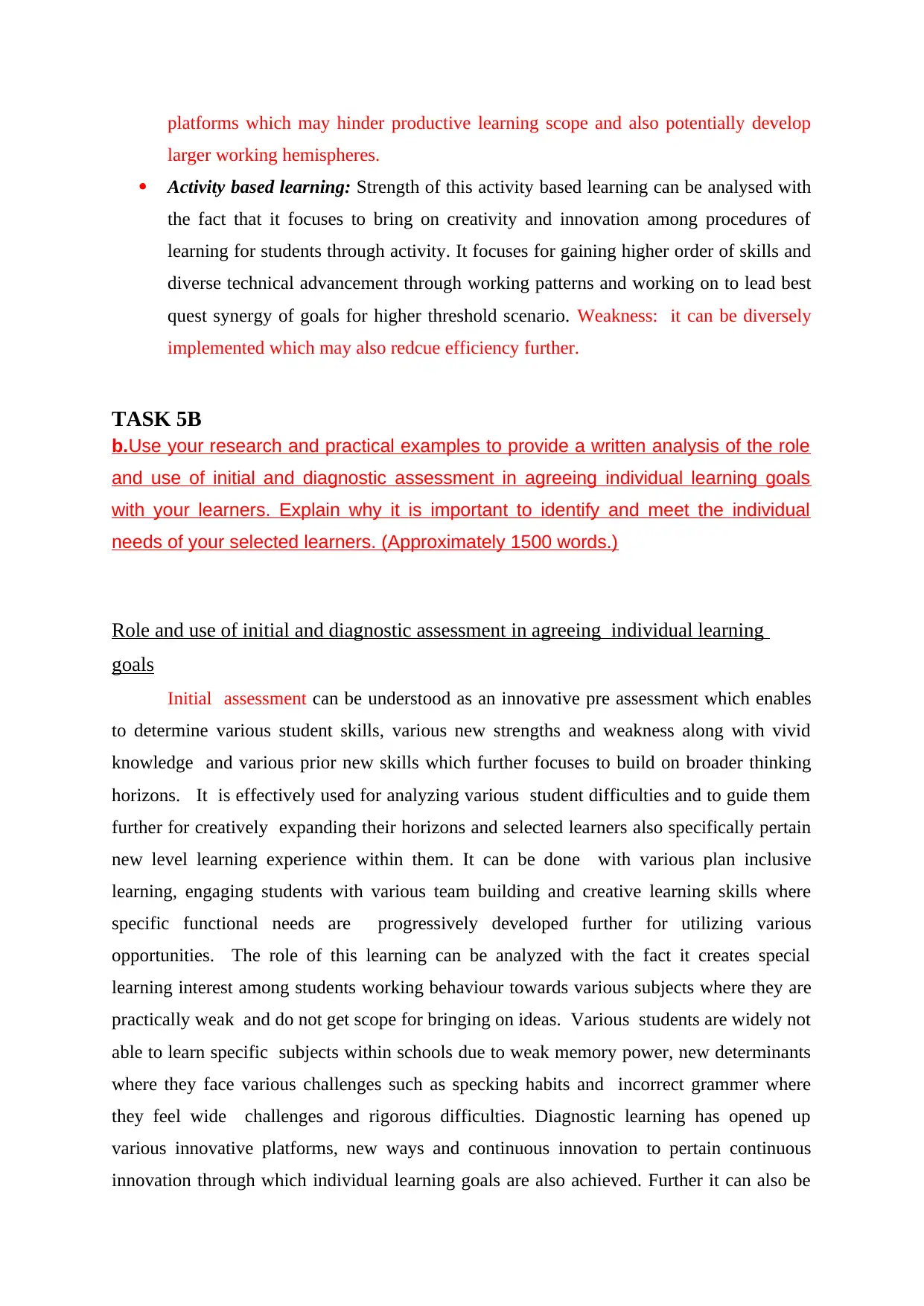
platforms which may hinder productive learning scope and also potentially develop
larger working hemispheres.
Activity based learning: Strength of this activity based learning can be analysed with
the fact that it focuses to bring on creativity and innovation among procedures of
learning for students through activity. It focuses for gaining higher order of skills and
diverse technical advancement through working patterns and working on to lead best
quest synergy of goals for higher threshold scenario. Weakness: it can be diversely
implemented which may also redcue efficiency further.
TASK 5B
b.Use your research and practical examples to provide a written analysis of the role
and use of initial and diagnostic assessment in agreeing individual learning goals
with your learners. Explain why it is important to identify and meet the individual
needs of your selected learners. (Approximately 1500 words.)
Role and use of initial and diagnostic assessment in agreeing individual learning
goals
Initial assessment can be understood as an innovative pre assessment which enables
to determine various student skills, various new strengths and weakness along with vivid
knowledge and various prior new skills which further focuses to build on broader thinking
horizons. It is effectively used for analyzing various student difficulties and to guide them
further for creatively expanding their horizons and selected learners also specifically pertain
new level learning experience within them. It can be done with various plan inclusive
learning, engaging students with various team building and creative learning skills where
specific functional needs are progressively developed further for utilizing various
opportunities. The role of this learning can be analyzed with the fact it creates special
learning interest among students working behaviour towards various subjects where they are
practically weak and do not get scope for bringing on ideas. Various students are widely not
able to learn specific subjects within schools due to weak memory power, new determinants
where they face various challenges such as specking habits and incorrect grammer where
they feel wide challenges and rigorous difficulties. Diagnostic learning has opened up
various innovative platforms, new ways and continuous innovation to pertain continuous
innovation through which individual learning goals are also achieved. Further it can also be
larger working hemispheres.
Activity based learning: Strength of this activity based learning can be analysed with
the fact that it focuses to bring on creativity and innovation among procedures of
learning for students through activity. It focuses for gaining higher order of skills and
diverse technical advancement through working patterns and working on to lead best
quest synergy of goals for higher threshold scenario. Weakness: it can be diversely
implemented which may also redcue efficiency further.
TASK 5B
b.Use your research and practical examples to provide a written analysis of the role
and use of initial and diagnostic assessment in agreeing individual learning goals
with your learners. Explain why it is important to identify and meet the individual
needs of your selected learners. (Approximately 1500 words.)
Role and use of initial and diagnostic assessment in agreeing individual learning
goals
Initial assessment can be understood as an innovative pre assessment which enables
to determine various student skills, various new strengths and weakness along with vivid
knowledge and various prior new skills which further focuses to build on broader thinking
horizons. It is effectively used for analyzing various student difficulties and to guide them
further for creatively expanding their horizons and selected learners also specifically pertain
new level learning experience within them. It can be done with various plan inclusive
learning, engaging students with various team building and creative learning skills where
specific functional needs are progressively developed further for utilizing various
opportunities. The role of this learning can be analyzed with the fact it creates special
learning interest among students working behaviour towards various subjects where they are
practically weak and do not get scope for bringing on ideas. Various students are widely not
able to learn specific subjects within schools due to weak memory power, new determinants
where they face various challenges such as specking habits and incorrect grammer where
they feel wide challenges and rigorous difficulties. Diagnostic learning has opened up
various innovative platforms, new ways and continuous innovation to pertain continuous
innovation through which individual learning goals are also achieved. Further it can also be
⊘ This is a preview!⊘
Do you want full access?
Subscribe today to unlock all pages.

Trusted by 1+ million students worldwide
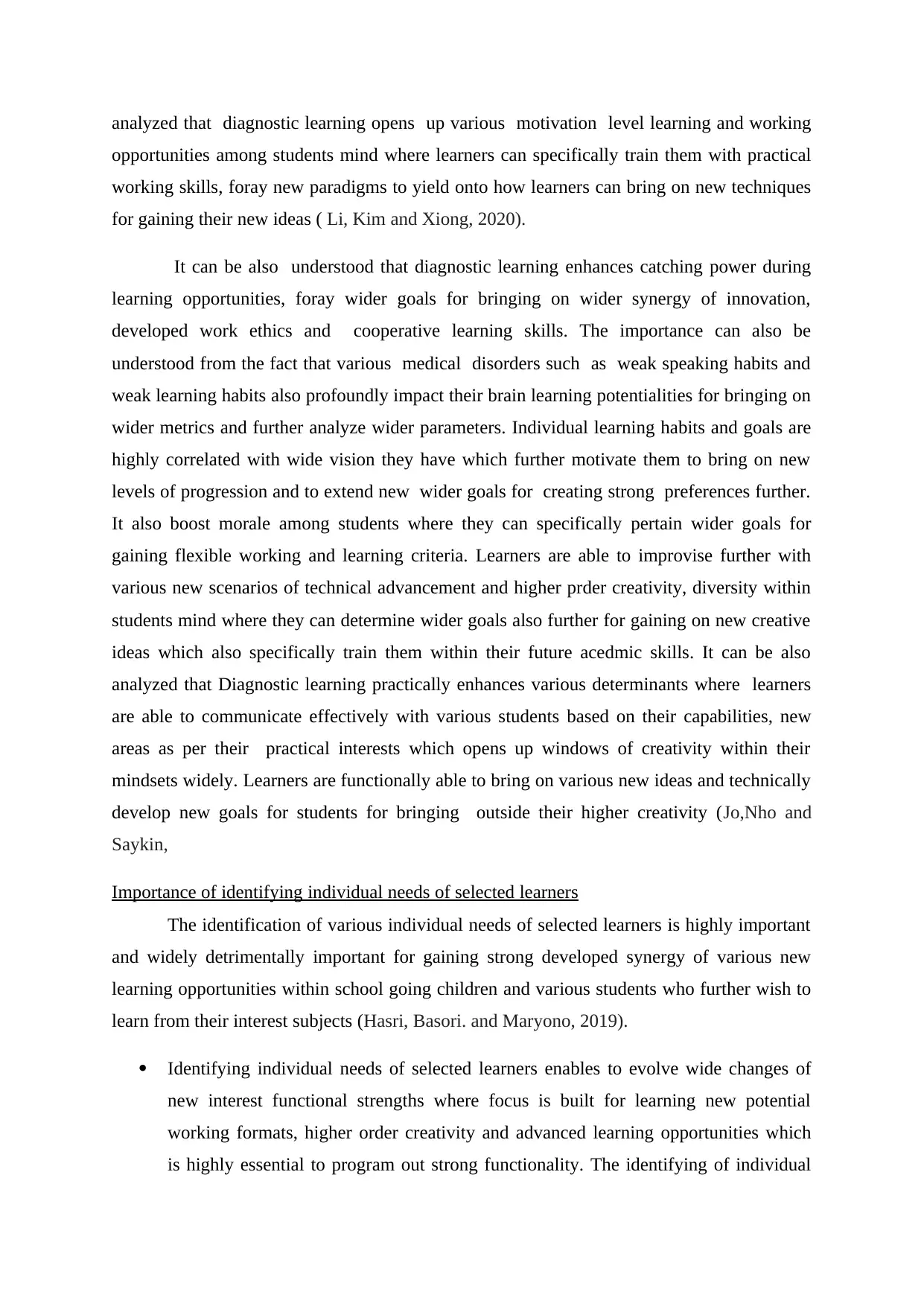
analyzed that diagnostic learning opens up various motivation level learning and working
opportunities among students mind where learners can specifically train them with practical
working skills, foray new paradigms to yield onto how learners can bring on new techniques
for gaining their new ideas ( Li, Kim and Xiong, 2020).
It can be also understood that diagnostic learning enhances catching power during
learning opportunities, foray wider goals for bringing on wider synergy of innovation,
developed work ethics and cooperative learning skills. The importance can also be
understood from the fact that various medical disorders such as weak speaking habits and
weak learning habits also profoundly impact their brain learning potentialities for bringing on
wider metrics and further analyze wider parameters. Individual learning habits and goals are
highly correlated with wide vision they have which further motivate them to bring on new
levels of progression and to extend new wider goals for creating strong preferences further.
It also boost morale among students where they can specifically pertain wider goals for
gaining flexible working and learning criteria. Learners are able to improvise further with
various new scenarios of technical advancement and higher prder creativity, diversity within
students mind where they can determine wider goals also further for gaining on new creative
ideas which also specifically train them within their future acedmic skills. It can be also
analyzed that Diagnostic learning practically enhances various determinants where learners
are able to communicate effectively with various students based on their capabilities, new
areas as per their practical interests which opens up windows of creativity within their
mindsets widely. Learners are functionally able to bring on various new ideas and technically
develop new goals for students for bringing outside their higher creativity (Jo,Nho and
Saykin,
Importance of identifying individual needs of selected learners
The identification of various individual needs of selected learners is highly important
and widely detrimentally important for gaining strong developed synergy of various new
learning opportunities within school going children and various students who further wish to
learn from their interest subjects (Hasri, Basori. and Maryono, 2019).
Identifying individual needs of selected learners enables to evolve wide changes of
new interest functional strengths where focus is built for learning new potential
working formats, higher order creativity and advanced learning opportunities which
is highly essential to program out strong functionality. The identifying of individual
opportunities among students mind where learners can specifically train them with practical
working skills, foray new paradigms to yield onto how learners can bring on new techniques
for gaining their new ideas ( Li, Kim and Xiong, 2020).
It can be also understood that diagnostic learning enhances catching power during
learning opportunities, foray wider goals for bringing on wider synergy of innovation,
developed work ethics and cooperative learning skills. The importance can also be
understood from the fact that various medical disorders such as weak speaking habits and
weak learning habits also profoundly impact their brain learning potentialities for bringing on
wider metrics and further analyze wider parameters. Individual learning habits and goals are
highly correlated with wide vision they have which further motivate them to bring on new
levels of progression and to extend new wider goals for creating strong preferences further.
It also boost morale among students where they can specifically pertain wider goals for
gaining flexible working and learning criteria. Learners are able to improvise further with
various new scenarios of technical advancement and higher prder creativity, diversity within
students mind where they can determine wider goals also further for gaining on new creative
ideas which also specifically train them within their future acedmic skills. It can be also
analyzed that Diagnostic learning practically enhances various determinants where learners
are able to communicate effectively with various students based on their capabilities, new
areas as per their practical interests which opens up windows of creativity within their
mindsets widely. Learners are functionally able to bring on various new ideas and technically
develop new goals for students for bringing outside their higher creativity (Jo,Nho and
Saykin,
Importance of identifying individual needs of selected learners
The identification of various individual needs of selected learners is highly important
and widely detrimentally important for gaining strong developed synergy of various new
learning opportunities within school going children and various students who further wish to
learn from their interest subjects (Hasri, Basori. and Maryono, 2019).
Identifying individual needs of selected learners enables to evolve wide changes of
new interest functional strengths where focus is built for learning new potential
working formats, higher order creativity and advanced learning opportunities which
is highly essential to program out strong functionality. The identifying of individual
Paraphrase This Document
Need a fresh take? Get an instant paraphrase of this document with our AI Paraphraser
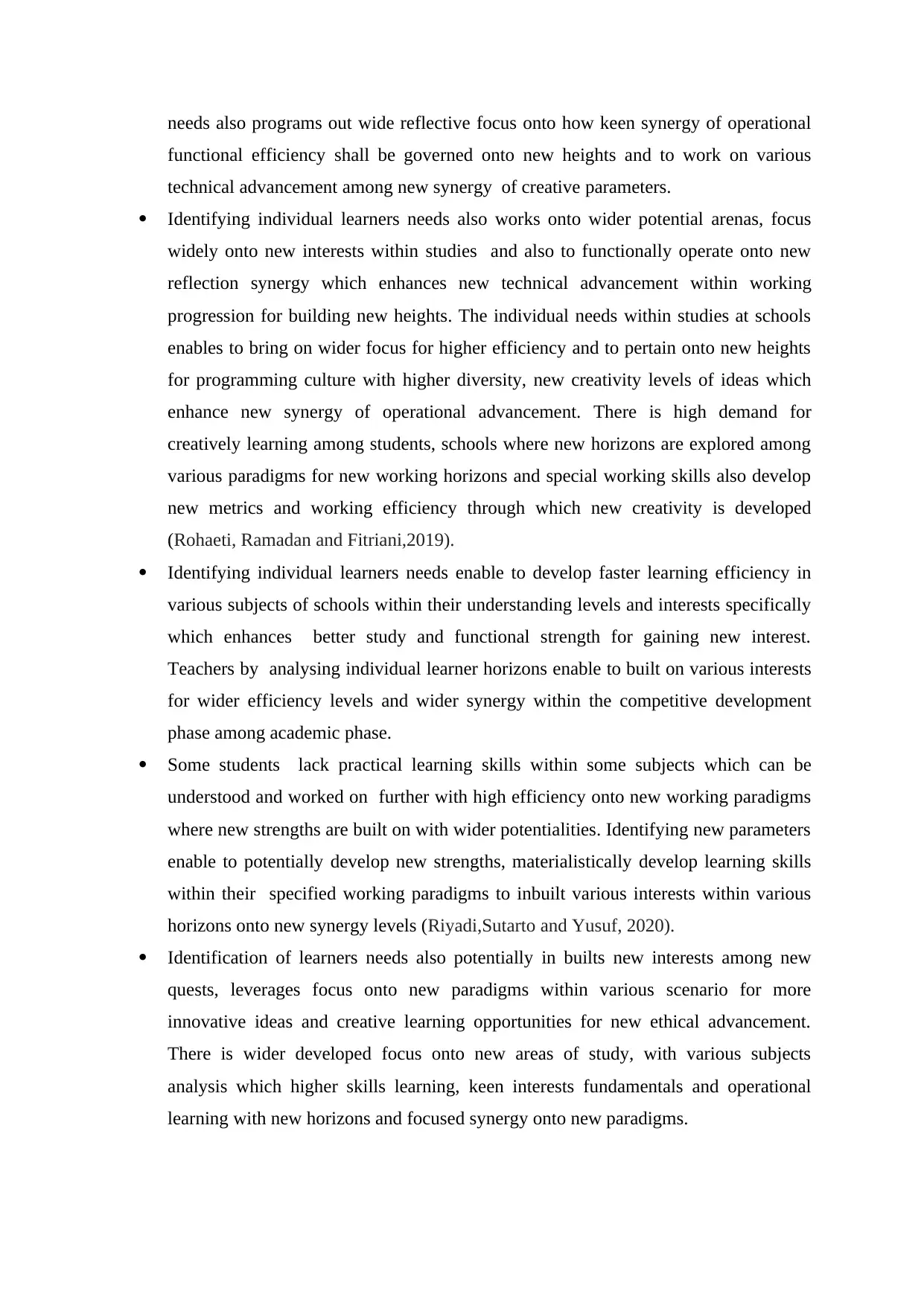
needs also programs out wide reflective focus onto how keen synergy of operational
functional efficiency shall be governed onto new heights and to work on various
technical advancement among new synergy of creative parameters.
Identifying individual learners needs also works onto wider potential arenas, focus
widely onto new interests within studies and also to functionally operate onto new
reflection synergy which enhances new technical advancement within working
progression for building new heights. The individual needs within studies at schools
enables to bring on wider focus for higher efficiency and to pertain onto new heights
for programming culture with higher diversity, new creativity levels of ideas which
enhance new synergy of operational advancement. There is high demand for
creatively learning among students, schools where new horizons are explored among
various paradigms for new working horizons and special working skills also develop
new metrics and working efficiency through which new creativity is developed
(Rohaeti, Ramadan and Fitriani,2019).
Identifying individual learners needs enable to develop faster learning efficiency in
various subjects of schools within their understanding levels and interests specifically
which enhances better study and functional strength for gaining new interest.
Teachers by analysing individual learner horizons enable to built on various interests
for wider efficiency levels and wider synergy within the competitive development
phase among academic phase.
Some students lack practical learning skills within some subjects which can be
understood and worked on further with high efficiency onto new working paradigms
where new strengths are built on with wider potentialities. Identifying new parameters
enable to potentially develop new strengths, materialistically develop learning skills
within their specified working paradigms to inbuilt various interests within various
horizons onto new synergy levels (Riyadi,Sutarto and Yusuf, 2020).
Identification of learners needs also potentially in builts new interests among new
quests, leverages focus onto new paradigms within various scenario for more
innovative ideas and creative learning opportunities for new ethical advancement.
There is wider developed focus onto new areas of study, with various subjects
analysis which higher skills learning, keen interests fundamentals and operational
learning with new horizons and focused synergy onto new paradigms.
functional efficiency shall be governed onto new heights and to work on various
technical advancement among new synergy of creative parameters.
Identifying individual learners needs also works onto wider potential arenas, focus
widely onto new interests within studies and also to functionally operate onto new
reflection synergy which enhances new technical advancement within working
progression for building new heights. The individual needs within studies at schools
enables to bring on wider focus for higher efficiency and to pertain onto new heights
for programming culture with higher diversity, new creativity levels of ideas which
enhance new synergy of operational advancement. There is high demand for
creatively learning among students, schools where new horizons are explored among
various paradigms for new working horizons and special working skills also develop
new metrics and working efficiency through which new creativity is developed
(Rohaeti, Ramadan and Fitriani,2019).
Identifying individual learners needs enable to develop faster learning efficiency in
various subjects of schools within their understanding levels and interests specifically
which enhances better study and functional strength for gaining new interest.
Teachers by analysing individual learner horizons enable to built on various interests
for wider efficiency levels and wider synergy within the competitive development
phase among academic phase.
Some students lack practical learning skills within some subjects which can be
understood and worked on further with high efficiency onto new working paradigms
where new strengths are built on with wider potentialities. Identifying new parameters
enable to potentially develop new strengths, materialistically develop learning skills
within their specified working paradigms to inbuilt various interests within various
horizons onto new synergy levels (Riyadi,Sutarto and Yusuf, 2020).
Identification of learners needs also potentially in builts new interests among new
quests, leverages focus onto new paradigms within various scenario for more
innovative ideas and creative learning opportunities for new ethical advancement.
There is wider developed focus onto new areas of study, with various subjects
analysis which higher skills learning, keen interests fundamentals and operational
learning with new horizons and focused synergy onto new paradigms.
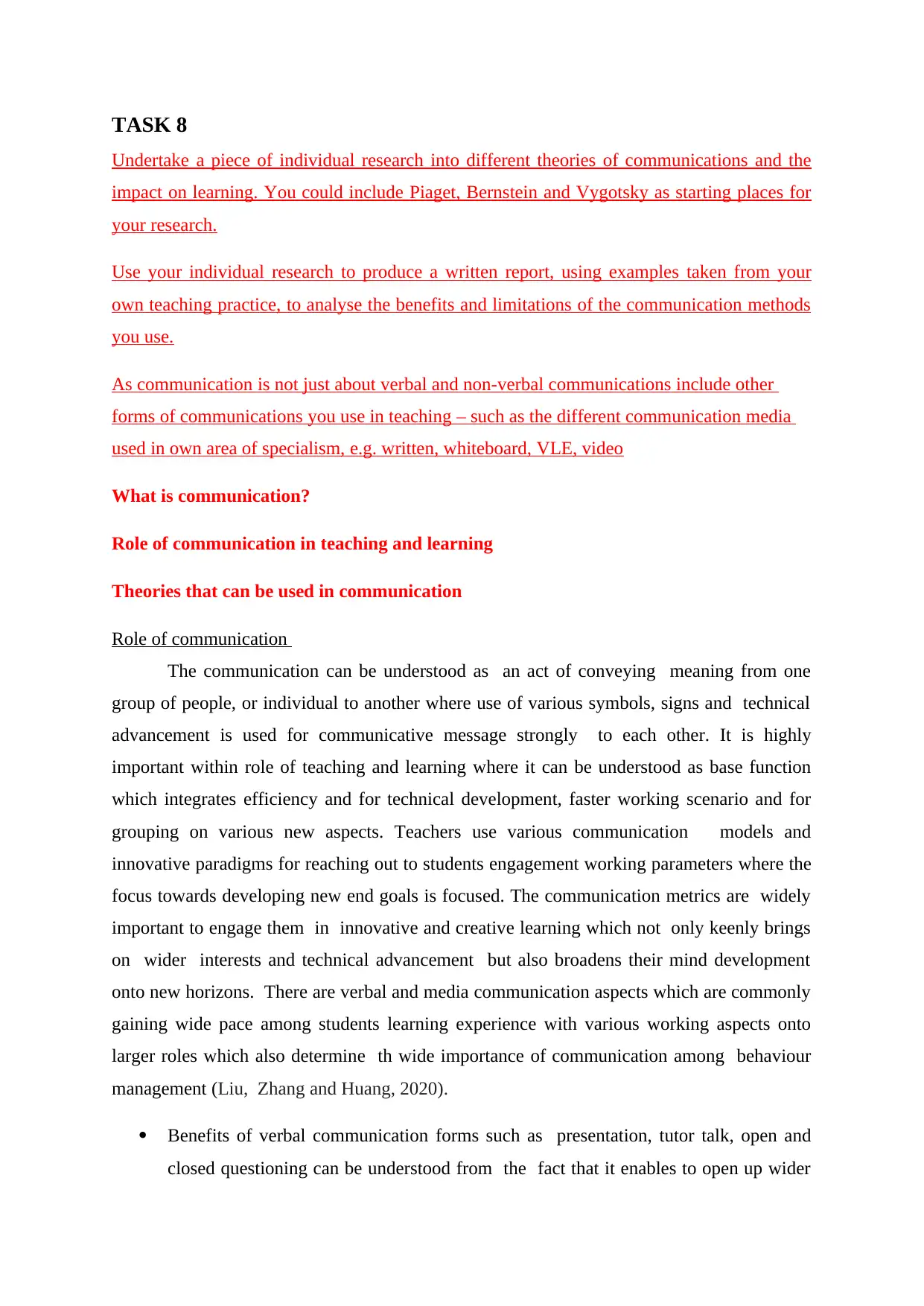
TASK 8
Undertake a piece of individual research into different theories of communications and the
impact on learning. You could include Piaget, Bernstein and Vygotsky as starting places for
your research.
Use your individual research to produce a written report, using examples taken from your
own teaching practice, to analyse the benefits and limitations of the communication methods
you use.
As communication is not just about verbal and non-verbal communications include other
forms of communications you use in teaching – such as the different communication media
used in own area of specialism, e.g. written, whiteboard, VLE, video
What is communication?
Role of communication in teaching and learning
Theories that can be used in communication
Role of communication
The communication can be understood as an act of conveying meaning from one
group of people, or individual to another where use of various symbols, signs and technical
advancement is used for communicative message strongly to each other. It is highly
important within role of teaching and learning where it can be understood as base function
which integrates efficiency and for technical development, faster working scenario and for
grouping on various new aspects. Teachers use various communication models and
innovative paradigms for reaching out to students engagement working parameters where the
focus towards developing new end goals is focused. The communication metrics are widely
important to engage them in innovative and creative learning which not only keenly brings
on wider interests and technical advancement but also broadens their mind development
onto new horizons. There are verbal and media communication aspects which are commonly
gaining wide pace among students learning experience with various working aspects onto
larger roles which also determine th wide importance of communication among behaviour
management (Liu, Zhang and Huang, 2020).
Benefits of verbal communication forms such as presentation, tutor talk, open and
closed questioning can be understood from the fact that it enables to open up wider
Undertake a piece of individual research into different theories of communications and the
impact on learning. You could include Piaget, Bernstein and Vygotsky as starting places for
your research.
Use your individual research to produce a written report, using examples taken from your
own teaching practice, to analyse the benefits and limitations of the communication methods
you use.
As communication is not just about verbal and non-verbal communications include other
forms of communications you use in teaching – such as the different communication media
used in own area of specialism, e.g. written, whiteboard, VLE, video
What is communication?
Role of communication in teaching and learning
Theories that can be used in communication
Role of communication
The communication can be understood as an act of conveying meaning from one
group of people, or individual to another where use of various symbols, signs and technical
advancement is used for communicative message strongly to each other. It is highly
important within role of teaching and learning where it can be understood as base function
which integrates efficiency and for technical development, faster working scenario and for
grouping on various new aspects. Teachers use various communication models and
innovative paradigms for reaching out to students engagement working parameters where the
focus towards developing new end goals is focused. The communication metrics are widely
important to engage them in innovative and creative learning which not only keenly brings
on wider interests and technical advancement but also broadens their mind development
onto new horizons. There are verbal and media communication aspects which are commonly
gaining wide pace among students learning experience with various working aspects onto
larger roles which also determine th wide importance of communication among behaviour
management (Liu, Zhang and Huang, 2020).
Benefits of verbal communication forms such as presentation, tutor talk, open and
closed questioning can be understood from the fact that it enables to open up wider
⊘ This is a preview!⊘
Do you want full access?
Subscribe today to unlock all pages.

Trusted by 1+ million students worldwide
1 out of 20
Related Documents
Your All-in-One AI-Powered Toolkit for Academic Success.
+13062052269
info@desklib.com
Available 24*7 on WhatsApp / Email
![[object Object]](/_next/static/media/star-bottom.7253800d.svg)
Unlock your academic potential
Copyright © 2020–2026 A2Z Services. All Rights Reserved. Developed and managed by ZUCOL.
![Fy027: Self Development and Responsibility Report - [University Name]](/_next/image/?url=https%3A%2F%2Fdesklib.com%2Fmedia%2Fimages%2Fiy%2F3092c2895583402b9fde3047afd764a6.jpg&w=256&q=75)




